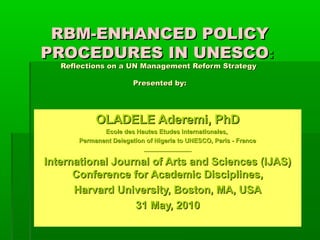
Rbm Enhanced Policy Procedures In Unesco
- 1. RBM-ENHANCED POLICY PROCEDURES IN UNESCO: Reflections on a UN Management Reform Strategy Presented by: OLADELE Aderemi, PhD Ecole des Hautes Etudes Internationales, Permanent Delegation of Nigeria to UNESCO, Paris - France ________________ International Journal of Arts and Sciences (IJAS) Conference for Academic Disciplines, Harvard University, Boston, MA, USA 31 May, 2010
- 2. RBM-ENHANCED POLICY PROCEDURES IN UNESCO INTRODUCTION UNESCO United Nations (UN) Educational Scientific and Cultural Organization; A UN Specialized Agency on policy making, technical cooperation and assistance to countries in Education Science, Culture, Communication and Information THE UN REFORM Demand for reform was mainly based on perceived lack of the organization’s impact in its Member States in the late 90s; Reform must review administrative, Management and Policy Procedures as well as methods of programme implementation in countries RESUTS-BASED MANAGEMENT (RBM) RBM is as a management strategy focusing on performance and on achievement from outputs to outcomes and impacts; From 1960s to 1970s, the private sector had used RBM to enhance management by objectives. It was adopted in the process of public sector reform in OECD countries between 1980s and 1990s in response to budget deficits, lack of public confidence in government and demands for greater transparency and accountability
- 3. RBM-ENHANCED POLICY PROCEDURES IN UNESCO RBM AND UN REFORM IMPROVING MANAGEMENT AND POLICY PLANNING AT HEADQUARTERS MEANING: Planning and policies to consider final impact of activities at local levels; Management to be result focused with new criteria for measuring achievements against impacts ENFORCING DECENTRALIZATION POLICY More focus on field activities as since programmes are meant to be implemented there; Effective programming means more experts concentrated in the fields RBM IS TO: Streamline planning, policy and activities to entrench results at HQ; Continually create effective background for measuring results at HQ and fields to solidify decentralization
- 4. RBM-ENHANCED POLICY PROCEDURES IN UNESCO MILESTONE - 1: RBM TRAINING AND FOCAL POINTS RBM TRAINING DELIVERED TO UNECO STAFF AT HQ AND FIELD OFFICES BETWEEN 2003 – 2006 BY THE BUREAU OF STRATEGIC PLANNING RBM FOCAL POINTS WERE ESTABLISHED IN DIFFERENT SECTORS – THE ARE PRESENTLY 190 FOCAL POINTS IN OFFICES WORLD WIDE FROM 2005 TO 2007 TRAINING EXPANDED TO COMMON COUNTRY PROGRAMMING EXERCISE FROM 2005 TO 2007 TRAINING EXPANDED TO COMMON COUNTRY PROGRAMMING EXCERCISE FROM 2008 TRAINING INCLUDED PERMANENT DELAGATIONS OF MEMBER STATES AT HEADQUARTERS AND FUNCTIONARIES AT COUNTRIES’ NATIONAL COMMISSIONS FOR UNESCO – BASED AT HOME
- 5. RBM-ENHANCED POLICY PROCEDURES IN UNESCO MILESTONE- 2: RBM INFLUECING POLICY PLANNING AND DEBATE TWO MAJOR POLICY DOCUMENTS – THE MEDIUM TERM STRATEGY (C/4) AND DRAFT PROGRAMME AND BUDGET (C/5) THE C/4 IS A SIX YEAR STRATEGIC PLAN C/4 IS BROKEN DOWN TO DETAILED 3 C/5s TO COVER PROGRAMMING AND BUDGET FOR 3 BIENNIUM Chart I: linkage of the C/4 and the C/5 Source: UNESCO Bureau of Strategic Planning, the New Vision for 34 C/4 and the 34 C/5, p 10
- 6. RBM-ENHANCED POLICY PROCEDURES IN UNESCO MILESTONE- 2: RBM INFLUECING POLICY PLANNING AND DEBATE RBM CHANGES THE METHOD BY WHICH THE C/4 AND C/5 ARE PRESENTED THE C/4 BECOMES PRAGMATIC PRESENTING ACTION PLAN SUMMARY C/5s NOW UNDERSCORE : Main Lines of Action (MLAs); Expected Results; Performance Indicators; and Benchmarks C/5 SHIFTS FOCUS OF POLICY DEBATES FROM Emphasis on rhetoric; Budget-based discourse; and Privileging process over results
- 7. RBM-ENHANCED POLICY PROCEDURES IN UNESCO Chart I: Summary of the Medium Term Strategy (34 C/4), 2008-2013 - Chart 1 Source: UNESCO 34 C/4 p 38
- 8. RBM-ENHANCED POLICY PROCEDURES IN UNESCO Chart III: demonstrates the sequence of downward delivery and intended cohesion of the C/4 and C/5 up to country level activities. Medium Term Strategy (34/ C/4) – Chart 2 Source: UNESCO 34 C/4, p 39
- 9. RBM-ENHANCED POLICY PROCEDURES IN UNESCO Chart IV: Main Line of Action 3 on Sectoral Priority 2 of UNESCO Major Programme III – Social and Human Sciences as cited in 35 C/ 5 document Source: UNESCO 35 C/ 5, p 129
- 10. RBM-ENHANCED POLICY PROCEDURES IN UNESCO Chart V : Budget of Major Programme III – Social and Human Sciences in the 35 C/5 Source: UNESCO 35 C/ 5, p 112
- 11. RBM-ENHANCED POLICY PROCEDURES IN UNESCO FINDINGS/RECOMMENDATION/ CONCLUSION UNESCO has achieved progress in institutionalizing the RBM culture. It is suggested that this action must continue with improved intensity; One of the positive effects of RBM institutionalization is the improvement on the presentation of the two major planning and policy documents in UNESCO, the Medium Term Strategy (C/4) and the Programme and Budget document (C/5). The impact of this in the short run, although limited, is already being felt in the atmosphere and result-orientation of policy discussions. The medium and long term effect is foreseen as a lead to final breakthrough in the UN reform agenda; Training and capacity building on RBM of Member States’ management functionaries will harmonize action and create a synergy of increased overall impact of the RBM when combined with progress already made on the presentation of the C/4 and C/5. The rationale is such that it will help build advisory knowledge bank for officers charged with preparing policy briefs for representatives to the Governing Bodies and increase knowledge of management- for-results in Member States’ officials on field work for effective programme implementation and monitoring at country levels; For the latter to have full effect, this training, already being given to National Commissions and Permanent Delegations, should deliberately be extended to main Ministries and Government Agencies in Member States working in the fields of UNESCO’s competence, and, as with the Secretariat, UNESCO could persuade Governments to initiate RBM focal points in these Ministries and Agencies.
- 12. THANK YOU ! MERCI !